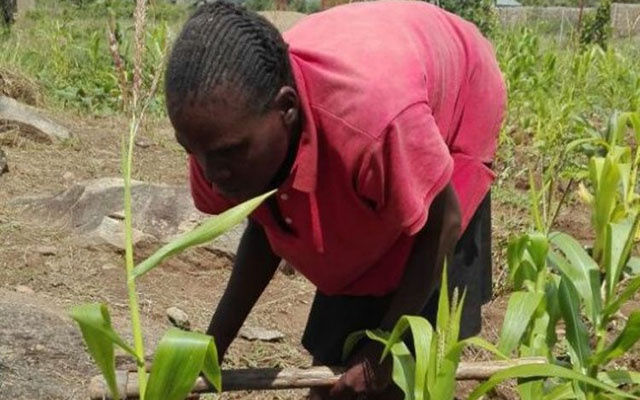Blind teacher fights joblessness with hoe


Mavis Simango weeds her maize crop. She bemoans heavy rains and floods that hit Mberengwa district recently, saying these scuttled her hopes for significant yields.
Freedom Mupanedemo Syndication Writer
Clutching a hoe in one hand, Ms Mavis Simango (36) of Mberengwa fumbles the ground with the other hand, weeding her maize field.
Despite her being visually-impaired, she has found a way to work in the field.
Her cultured hand can now differentiate her maize crop from weeds.
Under the mid-morning sun, she intermittently stands up to assuage her burning backbone and goes down, repeating the act, driven by the urge to survive.
Despite the taxing element brought by farming, it’s her only way of survival.
She has been struggling to get a job since graduating from Mutare Teachers’ College in 2015.
She says the maize field is her only oasis in a desert of hopelessness.
“I was born blind,” explains Ms Simango. “I am a teacher by profession, but I am struggling to get a job. I applied for a teaching post in the Masvingo and Midlands provinces, but I haven’t received any response.
“I have nowhere to turn to except farming. My family needs to eat. My husband, who is also blind, left for greener pastures in South Africa, but things are hard for him there.”
Ms Simango says her wish is to use her agricultural skills to feed her family.
“At least if I had a job, things could be better,” she says. “I have been advised to see Minister (Lazarus) Dokora (Minister of Primary and Secondary Education), but I have no access to him.
“I was lucky to get land, hence I am trying to eke out a living from farming. But I am sure you know farming is hard for a blind person like me.’’
Ms Simango is a mother of two from Mataga Village in Mberengwa district and has to soldier on, doing all the work like any normal villager.
Her husband, Mr Ngonidzashe Makura (40), left the family in search for greener pastures in 2015.
Two years on, he is still trying to make ends meet, albeit with no luck.
Ms Simango is left to fend for the family and in her sightless world, she has no choice, but to till the land.
In fact, she has to make sure that the family ticks after she lost all hope of getting a professional job.
What is only left for her is to get into peasant farming like any other villager.
Growing up, Ms Simango recalls hearing and reading many success stories of people living with disabilities making it in life.
However, this has not been the case with her.
She has been trying to fulfil the old adage; disability is not inability.
These have been her words of encouragement and today she is a qualified secondary school teacher after she persevered and graduated from Mutare Teachers’ College about three years ago.
“I attended Chegato High School and scored seven points at A-Level and enrolled for a teacher training course with Mutare Teachers’ College,” says Ms Simango.
“I completed my Diploma in Education three years ago, but until now I am failing to get a job. At times I feel disappointed by life, but what can I do?”
Married to Mr Makura, whom she met at high school, Ms Simango says she hoped for a better life despite their condition, but reality is proving to her that blindness comes with many other difficulties.
“Maybe being blind is a curse,” she says. “I am beginning to realise that life is cruel and even more crude if you are blind like me.
“My husband did not further his education after we completed A-Level at Chegato High School, he hoped I would get a teaching job to support the kids. Things did not go as planned and he had to leave for South Africa in search of a better life.
“He has not communicated and I have heard that he is begging on the streets of Johannesburg and things are not fine with him.”
Ms Simango says she is left to fend for the family and every day, she wakes up and gets busy in the fields like every other villager.
She bemoans the heavy rainfall and floods that hit Mberengwa district recently, saying she was not expecting to get any significant yields.
“I can plant, I can cultivate crops, but despite all this hard work, we were affected by floods and my yields will not be to my expectation,” says Ms Simango.
“While still doing my teaching diploma, I did my Teaching Practice (TP) at Chinyaradzo Secondary in Zaka and it was during this TP that I started building my four-roomed house.
“I could not finish it then and hoped to do it after getting a job, but the job is evading me. The house remains incomplete.”
A school headmaster who spoke to The Herald on condition of anonymity said negative perceptions about visually impaired teachers, could be the reason why schools were not keen to engage Ms Simango.
“She is a qualified teacher, yes, but you know headmasters are more concerned about the pass rate and maybe they think the idea that she is visually-impaired may compromise the pass rate,” said the headmaster.
“She needs an assistant and that assistant may not be so aggressive so as to make pupils understand.”
Senator representing people with disability in Parliament Annah Shiri was shocked that Ms Simango was failing to get a teaching job when the country was facing a shortage of teachers.
“Newspapers have run stories about the shortage of teachers in Zimbabwe, but here is a qualified teacher who is failing to get a job because of her condition, it is unfair and we will look into it,” she said. – Zimpapers Syndication Service.







Comments